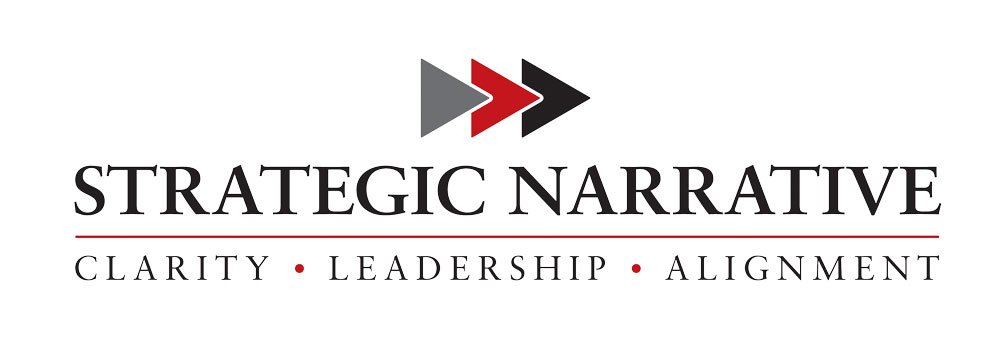Why you should always be the buyer and how a strong story makes that possible
I want to discuss a concept developed by supercoach Dan Sullivan, and it’s a simple idea: always be the buyer. He wrote a whole book about the idea. What does this mean? How is this relevant to service firms? And how does a powerful strategic narrative give you the power to make this true?
A buyer and a seller
In most commercial relationships there is a buyer and a seller. The assumption in that situation most of the time is that the buyer has the power and the seller is in some way subservient. The reason is the buyer has money and the seller wants some of it. In addition to that we all have an inbuilt fear of rejection and so if we are seeking to sell our services then this fear kicks in. Add the pressure to bill and win new clients and you can see where this goes.
What happens as a result? Well, in some cases, firms slash their wrists to win the business, accepting lower margins or rates in order to ‘sell successfully’.
The other thing that happens is that the relationship is established of superiority and inferiority, parent-child, the person with the power and the powerless. This is a fundamentally unstable situation because seeking to please a client can be a compromise conflicting with core professional values. In my training I show why a situation in which there is no mutual value is inherently unstable and unsustainable.
25 years ago my cousin David Maister wrote a book called ‘True Professionalism’ in which he said this:
“Act like a true professional, aiming for true excellence, and the money will follow.”
He gave a fantastic workshop to clients of mine at the time and many were shocked by his harsh statement that many professionals would do anything for the right fees, rather than basing their decisions about who to work with on principles and ethics. However, he was making a similar point to Dan Sullivan: your behaviour as a service provider will help determine the dynamics of the relationships you create.
Always be the buyer
Now, let’s consider the idea of always being the buyer. In this case you are deciding whether to ‘buy’ the relationship with a client through the currency of your services.
You have a choice as to who you work with, you have agency in the decision and you have the ability to reject the potential commercial partner even if they own the cash. This position leads to better selection of clients, higher quality work and a much greater chance of building more sustained, high trust relationships that drive better margins. Like a discerning buyer, you are choosing the very best customers to bring value to your firm in ways that include real profit.
The point here is that as a professional you are investing your time in return for payment. This is an exchange of value not simply a transaction. If the client does not properly value the skills, knowledge, principles and relationship that you bring to the party then they should not buy from you and you should not sell to them. If they do, then an exchange of value is a discussion between peers based on a business case for both parties and intended outcomes.
This goes beyond the sale and into the provision of the service. Pretty much any professional service is a relationship of interdependency. The service provider is dependent on the client playing their part in the work as much as vice versa. I have written somewhere else that professional service firms should aim to be trusted partners not trusted advisers for this very reason, and so it is important that in seeking to engage in a commercial relationship with a buyer you behave like a buyer too.
How the strategic narrative enables you to be the buyer
The starting point for a strategic narrative is to focus on where you are at your best. This is as a firm or individual. When you work with your very best clients, who bring the most satisfaction and probably make you the most money, what does that look like? Why is is true? What makes you great in that situation? What makes them such a good fit for your excellence?
And how can you create even greater value together?
Articulating this provides focus. It means you seek to do even more with these clients, and attract more like them. It enables you to articulate what makes you special, different and great and make that even more true.
Get this right and you become discerning. You want to spend your time with the right clients doing the right work because you are a great fit for each other, and you can articulate why this is the case. You are a peer achieving valuable outcomes together.
In one of my trainings I talk about ‘spear fishing’ instead of ‘net fishing’. You want to dive deep and target the big fish, not cast your net widely and see what you catch.
Can you see how this mindset makes you a buyer not a seller? As with everything I do, the fundamental driver for every involved is the power of choice. Clients have choice - and so do you.
Being the buyer is a powerful place to be
Always be the buyer, choosing who to work with in an active way. That is more likely to result in a higher return on your investment of time and commitment. And it will ensure you are continually growing your relationship capital, which is the unmeasured but critical asset which underpins the success of every service firm.
Does this resonate? If so, let’s have an open discussion about what this might mean for your business and what difference it would make for you and your team to always act like buyers with potential and actual clients.
